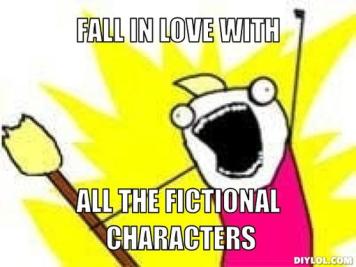Possibly the hardest pieces of editorial advice to accept is the suggestion that bits of your writing should be cut. When you’ve slavishly toiled over every word in your first draft, slashing them from your pages again can be sort of heartbreaking. You love ALL THE DETAILS you’ve created for your characters, and you want everyone else to love them too! The layout of the bathrooms in your space station on Zargon Four is REALLY COOL and NEEDS the eighteen pages of description that you have devoted to them!
One of the trickiest lessons to learn as a writer is to trust in your own words. Trust that you’ll probably need to write far more in your first draft, while you’re discovering your characters and your world, than will ever need to make it onto your final pages. Trust that sometimes a paragraph may not be necessary when a sentence or two will convey the same sentiment. And trust that your readers will be able to make the leaps you want them to make, without every infinitesimal detail sketched out for them.
Here is a little example from my novel, Life in Outer Space. No real spoilers here – this is the opening of a chapter early in the book, which gives a bit of background on one of the main character’s best friends. The first version is the paragraph as it was written in the original draft. The second version is the same section of text as it appears in the final book.
Original manuscript:
Adrian and I met in kindergarten when we were four. At least, that’s what Mum tells me. It’s not like I can remember the actual day he walked into my life. I don’t remember a significant incident, a montage of conversations in the sandpit that would change our lives forever or anything like that. Fact is, I just can’t remember a time when Adrian wasn’t around. The earliest Adrian-memories that have stuck are of him falling down a lot. Not being shoved over by arse-faced bullies — that would come later. I remember Adrian just walking over flat ground and then no longer being upright. His mum always says that he took longer than everyone else to learn to coordinate his arms and legs, but I have my own theory. Adrian Radley always had more stuff going on inside his head than the synapses of his brain could cope with. When we were kids, this meant that he’d be thinking about his play lunch, and the park, and about the episode of Dragonball-Z he’d watched that morning, and about fifty billion things he wanted to say to me all at the one time. Now it means the parts of Adrian’s brain that are thinking and the parts that are controlling his mouth are usually having different conversations. Sometimes in different conference rooms. Often, in different countries. If Mike is the brother I never had, then Adrian is the Chernobyl-born cousin who came for a visit and never left. I guess some people enter your orbit and get stuck in your gravity, and there’s nothing either of you can do about it.
Final draft:
Adrian and I met in kinder when we were four. At least, that’s what Mum tells me. It’s not like I can remember the actual day he walked into my life. I don’t remember a montage of conversations in the sandpit that would change our lives forever or anything like that. I just can’t remember a time when Adrian wasn’t around.
If Mike is the brother I never had, then Adrian Radley is the possibly inbreed cousin who came for a visit and never left. I guess some people enter your orbit and get stuck, and there’s nothing either of you can do about it.
[For the month of June, I will be writer-in-resident at the fab Inside a Dog - you can read the rest of this post here]




